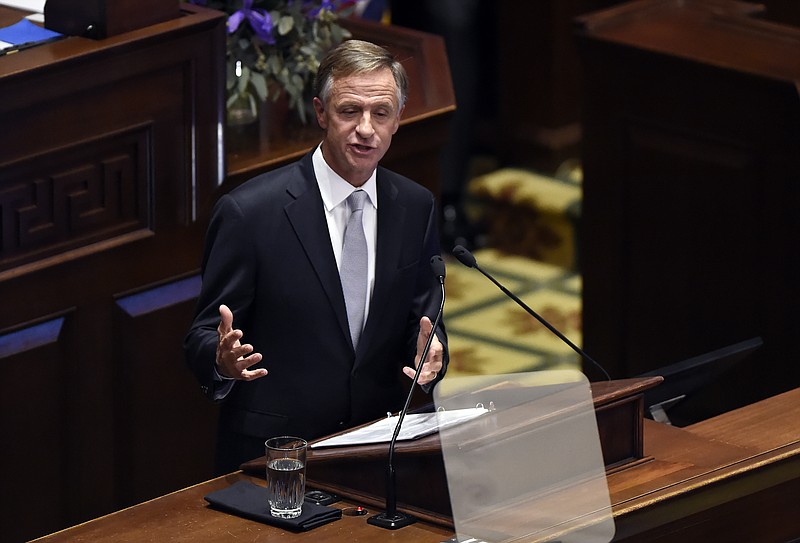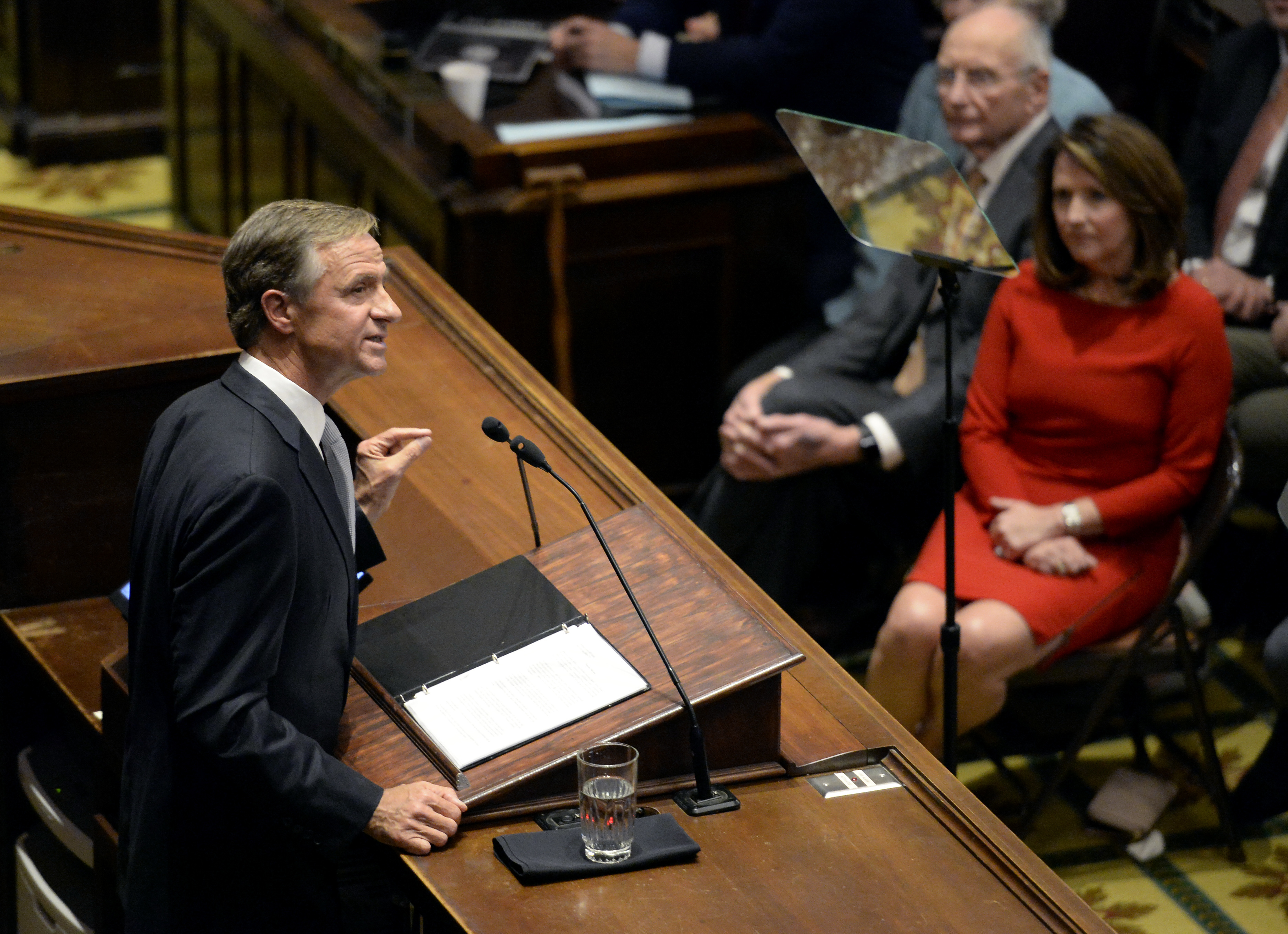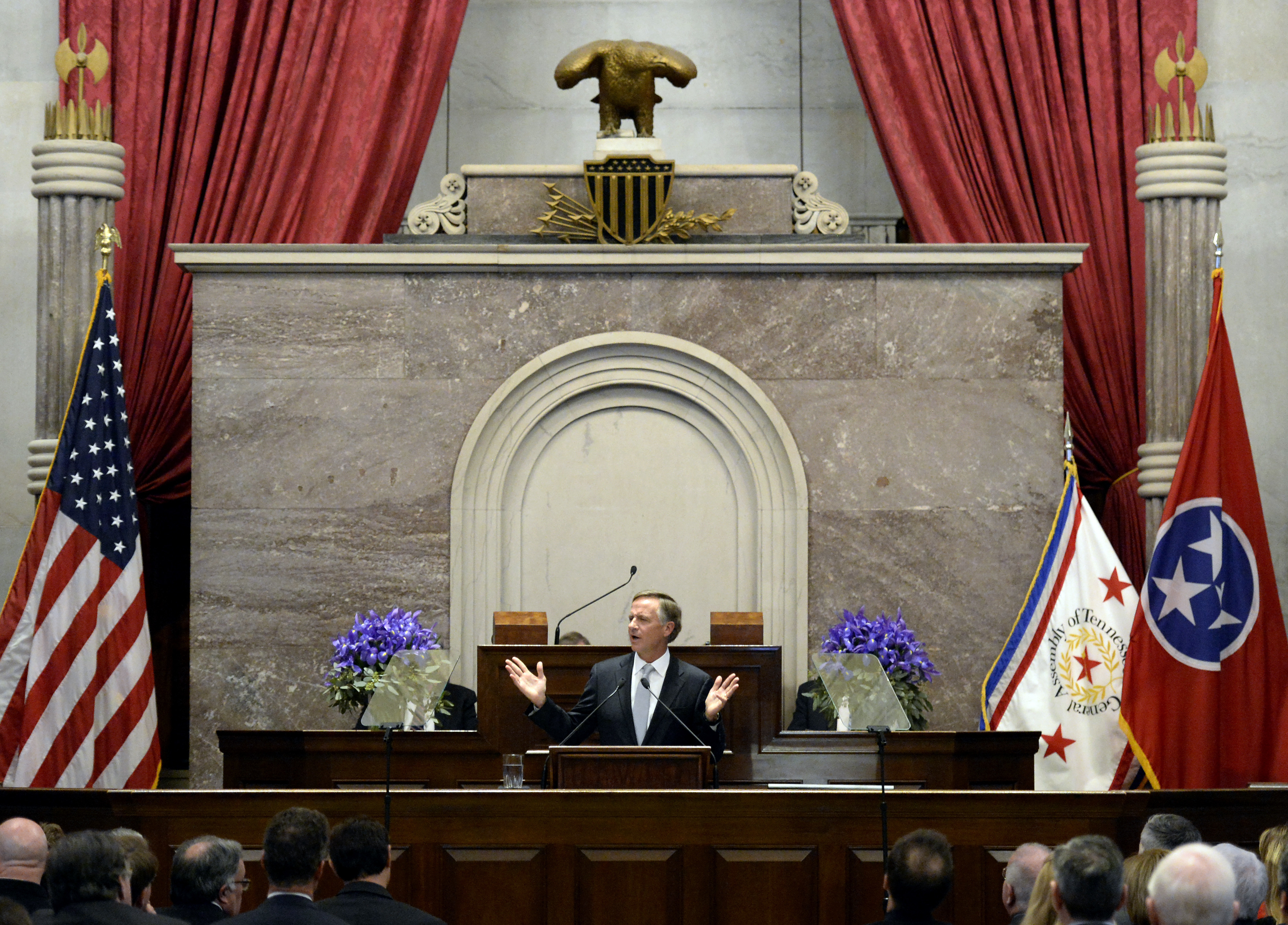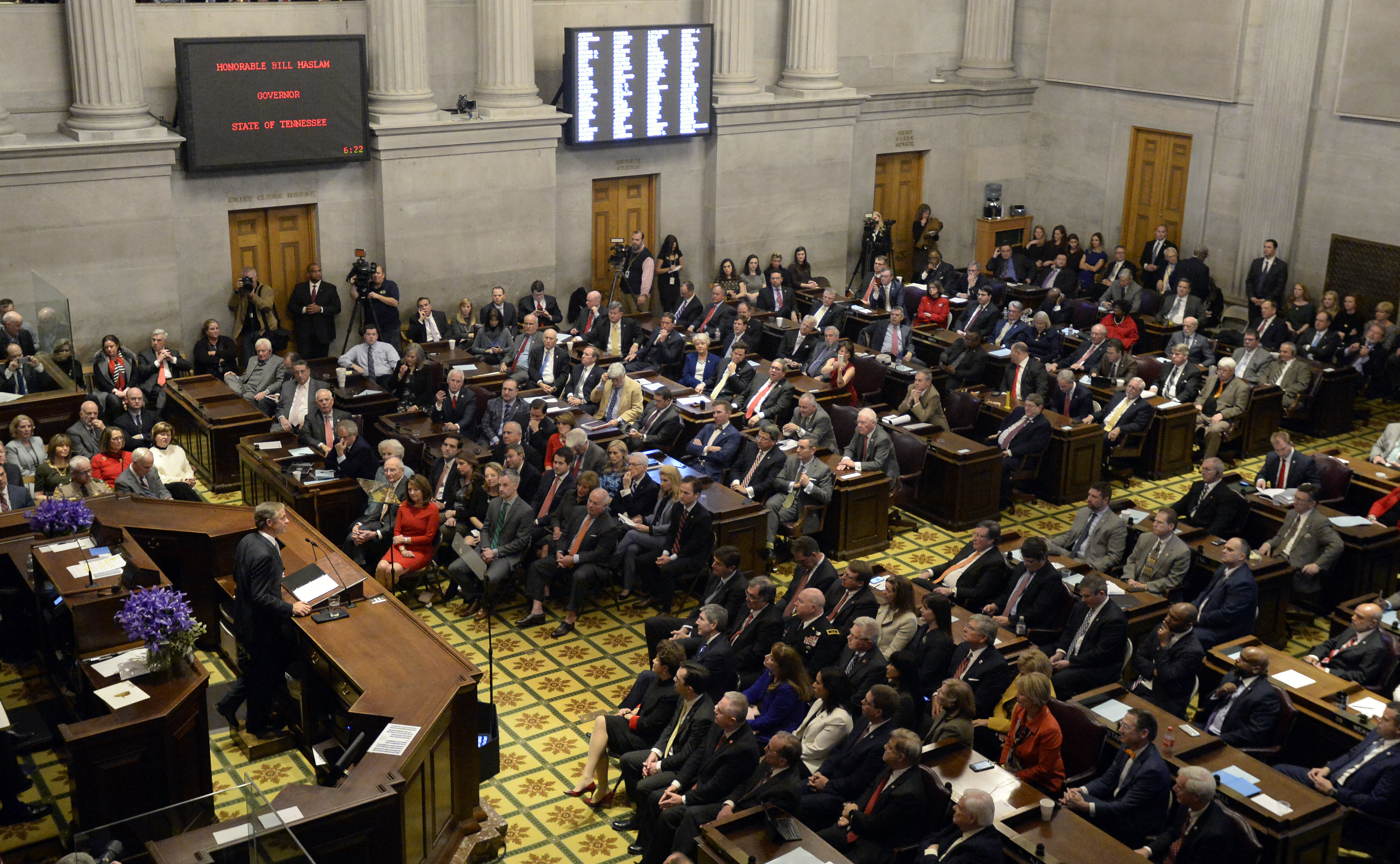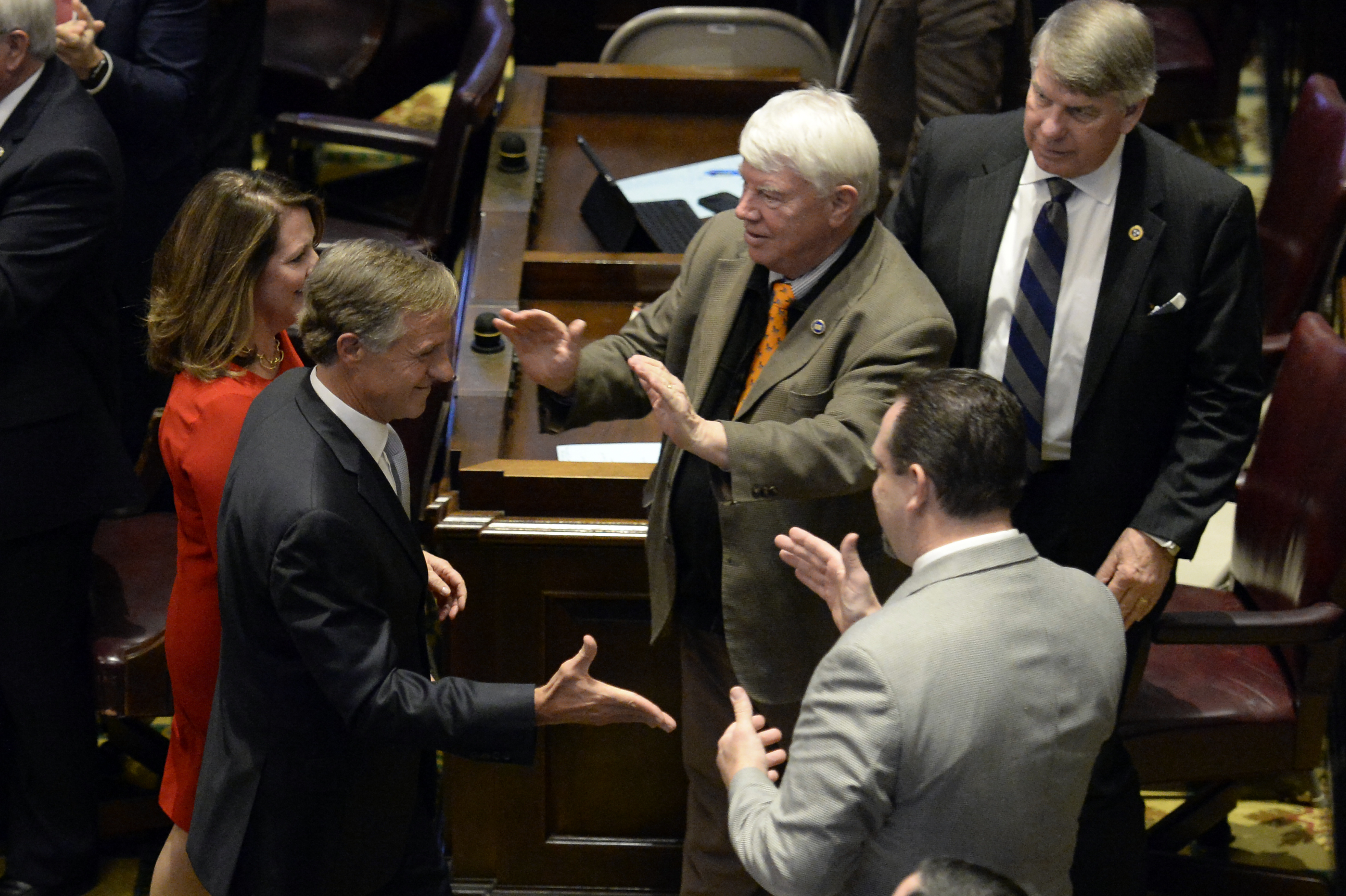NASHVILLE - Gov. Bill Haslam used his last state of the state address Monday to tout Tennessee's progress under his tenure and then challenge Tennesseans to lead the nation in creating high-paying jobs, boosting student educational achievement and providing the most efficient state services.
At the same time, the Republican unveiled a $37.5 billion spending plan aimed at boosting education, teacher pay and job growth while targeting the state's opioid epidemic.
"Seven years ago, we raised our expectations," Haslam told a joint convention of House, Senate and other top state government leaders as he outlined victories in areas ranging from national recognition for raising student test scores to cutting taxes by $572 million, offering free community college for residents and seeing more than 400,000 new jobs.
"We became the kind of leaders who didn't just talk about cutting taxes and enhancing services, we actually did lower taxes while growing our economy and providing access to high-quality education," Haslam said. "We cannot lose the momentum we have worked so hard to build."
He proposed to the Republican-controlled General Assembly, with whom he shared credit for gains, what he called a "bold new challenge."
"I want Tennessee to lead the nation in jobs, education and government efficiency," Haslam said. "I don't just want us to compete. I want us to be the best."
Sounding wistful at times, and at other points in the speech talking as if his eyes are on higher office once he leaves the governor's mansion a year from now, Haslam said the state's problem-solving abilities can be an example to the entire country.
Minority Democrats weren't exactly buying that. Earlier Monday they held yet another news conference sharply criticizing the governor's Tennessee Together plan to combat the state's high rate of opiate use and addiction as too little and too late.
"Let's face it," House Democratic Caucus Chairman Mike Stewart of Nashville told reporters as Democrats stood before a small plastic garbage can. "Unless something has changed ... the Republican plan to address the opioid crisis is a drop in the bucket."
Democrats said they have introduced a bill to provide $250 million in funding from the state's "rainy day" emergency reserve fund to address the problem. And they remain unhappy that Haslam again has ruled out trying to expand Medicaid under the federal Affordable Care Act. The governor tried that back in 2015 but was dealt a major defeat by Republicans in the Senate.
The Republican's final budget proposal for fiscal year 2018-2019 calls for more than $200 million in funds for K-12 education, $100 million for state colleges and universities, $128 million in economic development investments and $30 million to combat Tennesseans' addiction to pain killers.
He said that with the latest proposed education funding, his administration in his two four-year terms will have added $1.5 billion toward K-12 education, including $500 million more for teacher salaries, all while slashing state taxes by $572 million.
The proposed budget also provides other funding for salary increases for state workers and in higher education.
And it boosts with state's "rainy day" fund by some $50 million, bringing the total to $850 million.
Meanwhile, it calls for eliminating 335 positions across state government.
Haslam took other victory laps during the speech, pointing to his successful efforts to toughen teacher tenure protection laws, boost the number of charter schools and put new limits on lawsuit awards.
Earlier, he told reporters that "I think maybe one of the more important things to note here is that this budget in total money is basically flat [compared] to last year's. We'll be almost even in total dollars to last year."
One of Haslam's applause lines was an announcement that his Drive to 55 initiative to boost the percentage of Tennesseans with some type of post-secondary degree to 55 percent by 2025 will be reached two years earlier than expected.
The program has been fueled by the Tennessee Promise and Tennessee Reconnect programs, two other Haslam initiatives that offer lottery-funded free community college to recent high school graduates and adults.
The governor also spoke to his proposed Juvenile Justice Reform Act, a joint venture with the General Assembly to focus state resources on its most-troubled youth while intervening earlier with children just beginning to appear on law enforcement's radar.
"Too many kids get lost in the juvenile justice system. ... We can do better. We can be smarter," the governor said.
Haslam's budget recommendations also include his proposed final down payment on an administration hallmark, capital spending.
The budget includes tens of millions of dollars for projects or renovations of state and higher education facilities, including a $13 million state appropriation for a major renovation at the University of Tennessee at Chattanooga's Hunter Hall and $22.5 million in state money for Cleveland State Community College's campus revitalization plan.
The money would go toward a new general classroom building with laboratories at Cleveland State along with a renovation of the two-year college's humanities building.
Lt. Gov. Randy McNally, the Republican Senate speaker, praised the governor's speech, calling it an "outstanding final state of the state address tonight worthy of his successful tenure as governor. It was an important look back at the work that's been accomplished, but also a forward-looking speech on the issues we will tackle this year."
Rep. JoAnne Favors, D-Chattanooga, said she was impressed by the governor's speech and "pleased to be a part of some of the achievements."
She noted the governor's IMPROVE Act, which was passed last year to boost road spending, would never have passed the House without Democratic support. The legislation raised the state's fuel taxes for road improvements, which caused a number of House Republicans to balk, while also cutting the state sales tax on food from 5 percent to 4 percent and reducing corporate taxes on manufacturers.
As far as Tennessee being a national leader for other states, Favors said, "I don't feel that we are a leader in terms of other states. I talk to people in other states, attend conferences and I am aware of things going on in other states" in areas such as health care.
In an already low-tax state, the additional reductions will be felt during the next recession where "it's going to impact your schools, health care and other issues," Favors said.
Contact staff writer Andy Sher at asher@timesfreepress.com or 615-255-0550. Follow on Twitter @AndySher1.
